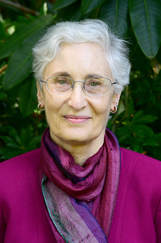WEEKEND IN QUEST 2019
PROGRAM HIGHLIGHTS
Poems and Prayers:
Modern Jewish Writers Reinterpreting Tradition
Scholar in Residence:
Professor Naomi Sokoloff
University of Washington, Seattle
The weekend program includes four study sessions:
Session 1: "Hey, Izzy, Listen Up! New Takes on the Shema"
From Primo Levi’s post-Holocaust poem “Shema” (1947) to Hava Pinhas-Cohen’s “Shema” (2015), with comments also on the Shema in American Sign Language, new liturgical versions of the Shema by Marcia Falk and Marge Piercy, and more.
Session 2: "The Blessings of Women Poets"
What is a bracha? How have Jewish women responded to and re-imagined traditional blessings? (for instance, in the work of Esther Raab and Hava Pinhas-Cohen).
Session 3: “13 ways of Looking at the Kaddish”
By examining lyrics (for example by Adrienne Rich, Charles Reznikoff, Alan Ginsberg, and Israeli rock musician Kobi Oz,) that respond to elements of the liturgy, we can gain insight into the traditional Kaddish, how it evolved, women’s roles in Judaism and public worship, and the allusive richness of Modern Hebrew.
Session 4: "Prayer Shawls: Making Space for Prayer in Poetry"
How can modern poems (by Avraham Shlonsky, Yehuda Amichai, and others) help us understand the significance of the prayer shawl in Jewish culture?
From Primo Levi’s post-Holocaust poem “Shema” (1947) to Hava Pinhas-Cohen’s “Shema” (2015), with comments also on the Shema in American Sign Language, new liturgical versions of the Shema by Marcia Falk and Marge Piercy, and more.
Session 2: "The Blessings of Women Poets"
What is a bracha? How have Jewish women responded to and re-imagined traditional blessings? (for instance, in the work of Esther Raab and Hava Pinhas-Cohen).
Session 3: “13 ways of Looking at the Kaddish”
By examining lyrics (for example by Adrienne Rich, Charles Reznikoff, Alan Ginsberg, and Israeli rock musician Kobi Oz,) that respond to elements of the liturgy, we can gain insight into the traditional Kaddish, how it evolved, women’s roles in Judaism and public worship, and the allusive richness of Modern Hebrew.
Session 4: "Prayer Shawls: Making Space for Prayer in Poetry"
How can modern poems (by Avraham Shlonsky, Yehuda Amichai, and others) help us understand the significance of the prayer shawl in Jewish culture?
In addition to the study sessions, we will gather for:
- Shabbat services Friday evening and Saturday morning, led by Ilene Safyan
- five meals together: catered Friday and Saturday dinners, catered Saturday lunch, and (for those staying overnight at the hotel) Saturday and Sunday breakfasts
- enjoyable Saturday evening program

